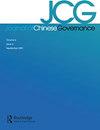Crippled community governance and suppressed scientific/professional communities: a critical assessment of failed early warning for the COVID-19 outbreak in China
IF 3.7
3区 社会学
Q1 POLITICAL SCIENCE
引用次数: 46
Abstract
Abstract The public governance of epidemic outbreaks faces great uncertainty. Successful governance is only possible with a competent early warning system, which hinges upon efficient production, sharing, and use of relevant knowledge and information. In this process, functional scientific/professional communities are critical gatekeepers. Analyzing China’s failed early warning for the COVID-19 outbreak, we show that an epidemic governance system dominated by bureaucratic forces is doomed to failure. In particular, we identify the lack of autonomy of scientific/professional communities—in this case, virologists, physicians, and epidemiologists—as one of the major contributing factors to the malfunction of the early warning system. Drawing upon the idea of community governance, we argue that only by empowering scientific/professional groups to exert efficient community governance can a state modernize its early warning system and perform better in combatting epidemics.社区治理瘫痪,科学/专业社区受到压制:对中国新冠肺炎疫情预警失败的关键评估
摘要疫情公共治理面临着巨大的不确定性。只有建立一个有效的早期预警系统,才能实现成功的治理,这取决于相关知识和信息的有效生产、共享和使用。在这一过程中,职能科学/专业团体是关键的看门人。通过分析中国对新冠肺炎疫情预警的失败,我们可以看出,官僚势力主导的疫情治理体系注定会失败。特别是,我们认为科学/专业社区——在这种情况下是病毒学家、医生和流行病学家——缺乏自主权是导致预警系统失灵的主要因素之一。根据社区治理的理念,我们认为,只有赋予科学/专业团体有效的社区治理权力,一个国家才能使其预警系统现代化,并在抗击流行病方面表现得更好。
本文章由计算机程序翻译,如有差异,请以英文原文为准。
求助全文
约1分钟内获得全文
求助全文

 求助内容:
求助内容: 应助结果提醒方式:
应助结果提醒方式:


